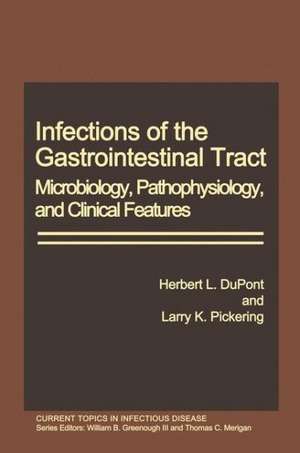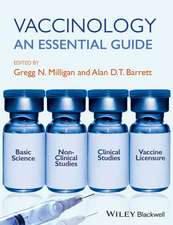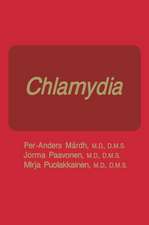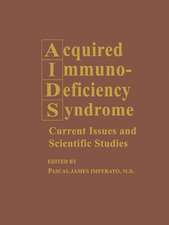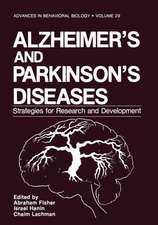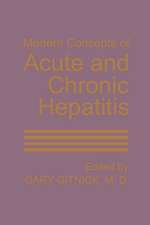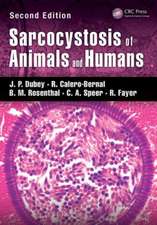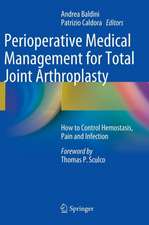Infections of the Gastrointestinal Tract: Microbiology, Pathophysiology, and Clinical Features: Current Topics in Infectious Disease
Autor Herbert L. Duponten Limba Engleză Paperback – 14 iun 2012
Preț: 714.83 lei
Preț vechi: 752.45 lei
-5% Nou
Puncte Express: 1072
Preț estimativ în valută:
136.83€ • 148.67$ • 115.01£
136.83€ • 148.67$ • 115.01£
Carte tipărită la comandă
Livrare economică 21 aprilie-05 mai
Preluare comenzi: 021 569.72.76
Specificații
ISBN-13: 9781468436976
ISBN-10: 146843697X
Pagini: 292
Ilustrații: XVI, 274 p. 31 illus.
Dimensiuni: 152 x 229 x 15 mm
Greutate: 0.4 kg
Ediția:Softcover reprint of the original 1st ed. 1980
Editura: Springer Us
Colecția Springer
Seria Current Topics in Infectious Disease
Locul publicării:New York, NY, United States
ISBN-10: 146843697X
Pagini: 292
Ilustrații: XVI, 274 p. 31 illus.
Dimensiuni: 152 x 229 x 15 mm
Greutate: 0.4 kg
Ediția:Softcover reprint of the original 1st ed. 1980
Editura: Springer Us
Colecția Springer
Seria Current Topics in Infectious Disease
Locul publicării:New York, NY, United States
Public țintă
ResearchCuprins
1. Immune Mechanisms in Infectious Diarrhea.- Nonspecific Gastrointestinal Immune Mechanisms.- Immunologic Mechanisms in Enteric Infection.- Breast Milk and Gastrointestinal Immunity.- Immunologic Control of Enteric Infection.- References.- 2. Amebiasis.- Epidemiology.- Pathogenesis.- Clinical Aspects.- Complications of Intestinal Amebiasis.- Diagnosis.- Serology.- Treatment.- References.- 3. Giardiasis.- Pathogenesis.- Epidemiology.- Clinical Aspects.- Diagnosis.- Treatment.- Immunity.- Prevention.- References.- 4. Bacillary Dysentery.- Bacteriology.- Pathogenesis.- Epidemiology.- Clinical Features.- Diagnosis.- Immunology of Shigellosis.- Therapy of Bacillary Dysentery.- References.- 5. Salmonellosis.- Bacteriology.- Virulence.- Pathogenesis.- Epidemiology.- Clinical Features.- Complications.- Institutional Salmonellosis.- Conditions Predisposing to or Associated with Salmonellosis.- Diagnosis.- Antimicrobial Resistance among Salmonella Organisms: Relationship of Human and Animal Strains.- Antimicrobial Therapy.- Immunoprophylaxis.- References.- 6. Cholera and Escherichia coli Diarrhea.- Cholera.- ETEC Diarrhea.- Enteropathogenic E. coli (by Serotype Identification).- References.- 7. Viral Agents in Diarrhea.- Norwalk-Like Agents.- Rotaviruses (RVs).- References.- 8. Relative Importance of Enteropathogens in Acute Endemic Diarrhea and Food-Borne Diarrheal Illness.- Acute Endemic Diarrhea.- Food-Borne Diarrheal Illness.- References.- 9. Diarrhea of Travelers (Emporiatric Enteritis).- Magnitude of the Problem and Populations at Risk.- Clinical Aspects.- Etiology.- Prevention of Travelers’ Diarrhea and the Source of the Problem.- References.- 10. Diagnosis and Treatment of Acute Diarrhea.- Diagnostic Procedures.- Nonspecific Therapy-Antidiarrheal Compounds.- SpecificAntimicrobial Therapy.- References.- 11. Fluid and Dietary Management of Acute Diarrhea.- Mechanisms of Fluid and Electrolyte Loss by Causative Agent.- Fluid and Electrolyte Therapy.- Initiation of a Modified Diet.- Disaccharidase Deficiency.- Diagnosis of Carbohydrate Malabsorption.- References.
